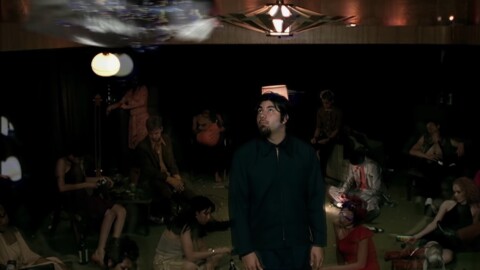
Since the turn of the millennium, the United Kingdom has taken on a particularly tragic new role in the Eurovision Song Contest – the talentless uncle who gets a pity invite to karaoke each year, and bores everybody to tears with a tuneless cover of an obscure B-side. A member of the so-called ‘Big Five’, the UK automatically qualifies for the final every year. Good news for our chosen songs getting to see the light of day, and terrible news for the rest of Europe.
In the interest of fairness, the UK has delivered some absolute sizzlers over the years: Bucks Fizz’s ‘Making Your Mind Up’ (1981), ‘Boom Bang-a-Bang’ by Lulu (1969) and Brotherhood of Man’s ‘Save Your Kisses for Me’ (1976) all hit the sweet spot, and won the whole thing accordingly. We’re clearly capable of greatness – but haven’t managed it in decades. Which begs the question: why must we flagellate ourselves in this manner, year after year, before blaming Brexit/international politics for our fair and inevitable failure? Why don’t we just send the Drag Race UK’s United Kingdolls and bask in sweet, sweet victory?
For the masochists who adore basking in humiliation, these are the UK’s worst entries to date, ranked from painfully boring to downright painful on the eardrums.
Kenneth McKellar, ‘A Man Without Love’ (1966)
Believe it or not, the UK wasn’t always shite at Eurovision – we served up a respectable amount of bangers in the 20th century, and scored five winners and a smattering of silver medals in the process. Marking a blip in this historical run of great form: the exceedingly dreary ‘A Man Without Love’ from 1966. “A man without love is only half a man,” warbles Kenneth McKellar, facing the camera with a piercing stare, “and half a man is nothing”. A poor message indeed from a man who should frankly know better – just enjoy being single for a bit, hun!
Worst bit: A wasted opportunity in the history of Eurovision-based kilt-wearing – not nearly enough screen time.
Engelbert Humperdinck, ‘Love Will Set You Free’ (2012)
In her 1964 essay Notes on Camp, the American writer Susan Sontag describes camp as “a seriousness that fails” – and so you would hope that Engelbert Humperdinck’s unfathomably earnest ‘Love Will Set You Free’ might’ve ended up becoming a masterpiece of the genre. Unfortunately, it’s just too middle-of-the-road for such heady heights: a perfectly forgettable, competently performed song about getting dumped. Credit where credit’s due, though – the man can hold a tune.
Worst bit: In such a tricky slot – the opening number of the night – Humperdinck’s ballad becomes even more of a buzzkill.
James Fox, ‘Hold On To Our Love’ (2004)
A glorified campfire ditty with all the melodrama of watching beige emulsion dry; not even a stirring bridge and some falsetto backing vocals can save ‘Hold On To Our Love’ from a fate worse than total failure – instead, this 2004 entry from a Fame Academy finalist is just staggeringly mediocre. Should’ve sent Alex Parks or Lemar instead.
Worst bit: The emotive key change that never quite arrives, dangling over the entire ballad like a mouldy carrot.
Black Lace, ‘Mary Ann’ (1979)
Narrated by a gravelly-voiced man who cheated on his girlfriend, promptly got dumped as a result, and now feels sad about it, Black Lace’s ‘Mary Ann’ spends most of its life swaggering around town clutching two bottles of plonk and feeling sorry for itself. “She was in black lace,” simpers the first verse, of the unnamed woman he cheated with, “I didn’t stand a chance”. Poor, poor defenceless baby, preyed upon by the mean horny lady!
Worst bit: Judging by those red flares, Mary Ann dodged a bullet.
Electro Velvet, ‘Still In Love With You’ (2015)
Post-2013, F. Scott Fitzgerald’s Roaring Twenties novel The Great Gatsby enjoyed an aspirational resurgence, aided by Baz Luhrmann’s glitzy film adaptation. Despite being a novel that broadly poked fun at rich people’s lavish stupidity, there was a short period in which it seemed like everyone was hiring out flapper costumes and cigarette holders for Gatsby-themed parties – and apparently Electro Velvet also got the memo in 2015. Combining the enthusiasm of World Book Day with the deeply divisive genre of electro-swing was ultimately a prohibition cocktail that didn’t pay off – netting just five points in the grand final.
Worst bit: When Alex Larke shouts “oh yes!” – channelling big Churchill insurance dog influence.
Scooch, ‘Flying the Flag’ (2007)
In centuries to come, the history books will remember ‘Flying the Flag’ as the very genesis of Brexit – essentially, it is a deeply horny song about sucking off the actual Union Jack. “Would you like something to suck on for landing, sir?” husks a suggestive air steward who appears to be dressed up as a Thunderbird attending prom, amid a sprinkling of salted nut innuendos, mouthpiece-blowing, and seat belt buckling. Nobody would’ve really blamed the EU for immediately holding their own referendum on whether to kick us out after this shit-show went down.
Worst bit: In between Scooch spanking themselves with signal paddles and the moment when they begin humping the perfume trolley, it’s difficult to pick just one.
Josh Dubovie, ‘That Sounds Good to Me’ (2010)
Emerging from a giant IKEA KALLAX shelving unit, Josh Dubovie looked beyond delighted to be representing his country in Oslo back in 2010 – and his wide-eyed ambition makes the immense failure of ‘That Sounds Good To Me’ even more painful to bear. Penned by ‘80s pop veteran Pete Waterman, it possesses all the dated swagger of a cheesy show tune, and Dubovie inadvertently resembles a Canary Wharf banker undoing the top button and ‘letting loose’ on a Tuesday afternoon. Led by the worst odds in UK Eurovision history, the dud ultimately scored a paltry 10 points (cheers Ireland, Georgia, Albania and Azerbaijan).
Worst bit: The irony of the song title.
Daz Sampson, ‘Teenage Life’ (2006)
Is that a… leather yellow tracksuit top Daz Sampson is wearing as he swaggers out from his hiding place behind a chalkboard? A PVC shirt? An incredibly shiny nylon number? Either way, it’s a look that gives poor Daz the air of a man who posts his grades on Facebook every GCSE results day, despite leaving secondary school in 1992. ‘Teenage Life’ would eventually end up in 19th place, with Daz putting its failure down to the avant-garde content. “Maybe Europe was not ready for Daz Sampson?” he wondered in a 2013 documentary. Determined to give Eurovision another go, he’s in the running to represent Belarus next year. Good on you, Daz.
Worst bit: “Now if you treat the kids fine, together they will shine (Ooh ooh ooh shine) And if you give the kids time, they won’t do the crime (Won’t do the crime)”
Samantha Janus, ‘A Message To Your Heart’ (1991)
A jarringly upbeat song about starving children and poverty – performed by Ronnie Mitchell from EastEnders, no less – it’s hardly a surprise that Samantha Womack (then, Janus) is slightly scarred by her shift representing the UK at Eurovision. The singer and actor later admitted that the lyrics to ‘A Message To Your Heart’ are burned into her memory years later, and called the entire performance “ridiculous”. Still, it eventually ended up in a fairly respectable 10th place – approximately 12 places higher than it really deserved.
Worst bit: The incredibly literal chorus choreography.
Jemini, ‘Cry Baby’ (2003)
If you loop the first 16 seconds of ‘Cry Baby’ on repeat, the UK’s 2003 entry – which famously received a damning nul points in the entire competition – sounds alright, underpinned by a moderately vibey guitar line pinched straight from an mid-tempo Enrique Iglesias number. Unfortunately, all this early promise is swept away by Jemini, who both sound flatter than a half-empty, fortnight old bottle of Coca-Cola left in a hot car. Not even Chris Cromby’s wildly flailing trouser chain can distract from this complete atrocity.
Worst bit: The deafening silence of the entire room the minute Jemini start singing.
The post The UK’s 10 worst Eurovision entries – from the painful to the plain boring appeared first on NME.







